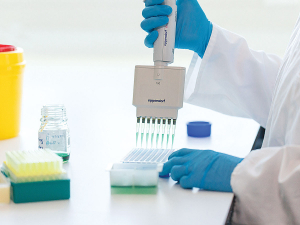Biosecurity NZ urges vigilance for yellow-legged hornets
Biosecurity New Zealand says Kiwis should continue to keep an eye out for yellow-legged hornets (Vespa velutina) over the holiday season.
 The National Animal Health Laboratory has acquired a $580,000 robot to perform animal disease testing.
The National Animal Health Laboratory has acquired a $580,000 robot to perform animal disease testing.
Could robotics be the secret to faster and improved animal disease testing?
It’s certainly a possibility, say Biosecurity New Zealand, who recently invested in a new antibody testing robot for the National Animal Health Laboratory.
The $580,000 high throughput diagnostic robot is the first of its kind in New Zealand and it is said will increase testing accuracy and consistency during future biosecurity responses.
“The Mycoplasma bovis outbreak gave us useful insights into how our laboratory could increase its capacity during a response. In particular, it highlighted the need for automation,” says Animal Health Laboratory manager Joseph O’Keefe.
“If an exotic disease such as foot-and-mouth disease (FMD) arrived here, our people could need to test some 3,000 up to 7,000 samples a day,” he says.
O’Keefe says automating the process will speed up the delivery of results, making the process faster for farmers and better for the wellbeing of everyone involved.
The Explorer G3 workstation was manufactured in Germany and is designed to test up to 7,000 samples per day for antibodies to FMD and other exotic diseases.
O’Keefe says the robot doesn’t need frequent attention or intervention, freeing Animal Health Laboratory staff for other testing and providing stability throughout intense response periods.
It can also run tests overnight without staff present.
“Testing delays can affect our economy as antibody testing is essential for maintaining the access and security of product exports to New Zealand’s international markets. If there is an exotic disease outbreak in New Zealand’s animals, automation will allow us to recover faster.”
The 750kg robot took a week to set up, with each part being brought safely into the biosecure containment area.
Once it was assembled, the team ran it through stringent testing and calibration to ensure the tests were as accurate as the current manual process. Now that this has been confirmed, the robot has begun day-to-day diagnostic testing.
The machine achieves its efficiency through moving test plates around. Each plate can contain approximately 90 samples and the robot manages up to 40 plates at once. Simultaneously, it adds samples and different reagents, washes and incubates the test plates.
Outside of responses, the robot is used to perform antibody tests for surveillance programmers, and for testing groups of animals for import or export purposes.
The Meat Industry Association of New Zealand (MIA) today announced that Chief Executive Officer Sirma Karapeeva has resigned from the role.
The winners of the 2026 Hawke’s Bay/Wairarapa Dairy Industry Awards were announced at the annual awards dinner held at Copthorne Solway Park in Masterton on Thursday evening.
Environment Southland is welcoming this week’s decision by the Environmental Protection Authority (EPA) to approve the release of Blaptea elguetai, a leaf‑feeding beetle that will help control the highly invasive Chilean flame creeper.
This March, the potato industry is proudly celebrating International Women’s Day on 8 March alongside the International Year of the Woman Farmer, recognising the vital role women play across every part of the sector — from paddocks and packhouses to research, leadership, and innovation.
Fruit trader Seeka posted a record profit and returns to shareholders in 2025.
Recent weather events in the Bay of Plenty, Gisborne/Tairawhiti, and Canterbury have been declared a medium-scale adverse event.

OPINION: A mate of yours truly reckons rural Manawatu families are the latest to suffer under what he calls the…
OPINION: If old Winston Peters thinks building trade relations with new nations, such as India, isn't a necessary investment in…